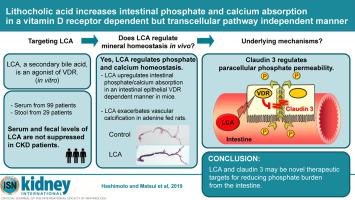当前位置:
X-MOL 学术
›
Kidney Int.
›
论文详情
Our official English website, www.x-mol.net, welcomes your
feedback! (Note: you will need to create a separate account there.)
Lithocholic acid increases intestinal phosphate and calcium absorption in a vitamin D receptor dependent but transcellular pathway independent manner.
Kidney International ( IF 14.8 ) Pub Date : 2020-02-25 , DOI: 10.1016/j.kint.2020.01.032 Nobuhiro Hashimoto 1 , Isao Matsui 1 , Satoshi Ishizuka 2 , Kazunori Inoue 1 , Ayumi Matsumoto 1 , Karin Shimada 1 , Shota Hori 2 , Dong Geun Lee 2 , Seiichi Yasuda 1 , Yusuke Katsuma 1 , Sachio Kajimoto 1 , Yohei Doi 1 , Satoshi Yamaguchi 1 , Keiichi Kubota 1 , Tatsufumi Oka 1 , Yusuke Sakaguchi 3 , Yoshitsugu Takabatake 1 , Takayuki Hamano 3 , Yoshitaka Isaka 1
Kidney International ( IF 14.8 ) Pub Date : 2020-02-25 , DOI: 10.1016/j.kint.2020.01.032 Nobuhiro Hashimoto 1 , Isao Matsui 1 , Satoshi Ishizuka 2 , Kazunori Inoue 1 , Ayumi Matsumoto 1 , Karin Shimada 1 , Shota Hori 2 , Dong Geun Lee 2 , Seiichi Yasuda 1 , Yusuke Katsuma 1 , Sachio Kajimoto 1 , Yohei Doi 1 , Satoshi Yamaguchi 1 , Keiichi Kubota 1 , Tatsufumi Oka 1 , Yusuke Sakaguchi 3 , Yoshitsugu Takabatake 1 , Takayuki Hamano 3 , Yoshitaka Isaka 1
Affiliation

|
Phosphate/calcium homeostasis is crucial for health maintenance. Lithocholic acid, a bile acid produced by intestinal bacteria, is an agonist of vitamin D receptor. However, its effects on phosphate/calcium homeostasis remain unclear. Here, we demonstrated that lithocholic acid increases intestinal phosphate/calcium absorption in an enterocyte vitamin D receptor-dependent manner. Lithocholic acid was found to increase serum phosphate/calcium levels and thus to exacerbate vascular calcification in animals with chronic kidney disease. Lithocholic acid did not affect levels of intestinal sodium-dependent phosphate transport protein 2b, Pi transporter-1, -2, or transient receptor potential vanilloid subfamily member 6. Everted gut sac analyses demonstrated that lithocholic acid increased phosphate/calcium absorption in a transcellular pathway-independent manner. Lithocholic acid suppressed intestinal mucosal claudin 3 and occludin in wild-type mice, but not in vitamin D receptor knockout mice. Everted gut sacs of claudin 3 knockout mice showed an increased permeability for phosphate, but not calcium. In patients with chronic kidney disease, serum 1,25(OH)2 vitamin D levels are decreased, probably as an intrinsic adjustment to reduce phosphate/calcium burden. In contrast, serum and fecal lithocholic acid levels and fecal levels of bile acid 7α-dehydratase, a rate-limiting enzyme involved in lithocholic acid production, were not downregulated. The effects of lithocholic acid were eliminated by bile acid adsorptive resin in mice. Thus, lithocholic acid and claudin 3 may represent novel therapeutic targets for reducing phosphate burden.
中文翻译:

胆酸通过维生素D受体依赖性但不依赖跨细胞途径的方式增加肠道磷酸盐和钙的吸收。
磷酸盐/钙稳态对维持健康至关重要。胆汁酸胆汁酸是维生素D受体的激动剂。但是,其对磷酸盐/钙稳态的影响尚不清楚。在这里,我们证明了石胆酸以肠上皮细胞维生素D受体依赖性方式增加肠道磷酸盐/钙的吸收。发现胆酸会增加患有慢性肾脏疾病的动物的血清磷酸盐/钙水平,从而加剧血管钙化。胆酸不会影响肠钠依赖性磷酸转运蛋白2b,Pi转运蛋白1,-2或瞬时受体电位类香草素亚家族成员6的水平。Everted肠囊分析表明,石胆酸以跨细胞途径独立的方式增加了磷酸盐/钙的吸收。胆酸可抑制野生型小鼠的肠粘膜claudin 3和occludin,但不能抑制维生素D受体敲除小鼠。claudin 3基因敲除小鼠的肠肠囊对磷酸盐的渗透性增加,但对钙的渗透性却增加。在患有慢性肾脏疾病的患者中,血清1,25(OH)2维生素D水平降低,可能是为了减少磷酸盐/钙的负担而进行的内在调节。相反,血清和粪便中的胆石酸水平以及胆汁酸7α-脱水酶(一种参与胆石酸生产的限速酶)的粪便水平并未下调。胆汁酸吸附树脂消除了小鼠胆石酸的影响。从而,
更新日期:2020-02-25
中文翻译:

胆酸通过维生素D受体依赖性但不依赖跨细胞途径的方式增加肠道磷酸盐和钙的吸收。
磷酸盐/钙稳态对维持健康至关重要。胆汁酸胆汁酸是维生素D受体的激动剂。但是,其对磷酸盐/钙稳态的影响尚不清楚。在这里,我们证明了石胆酸以肠上皮细胞维生素D受体依赖性方式增加肠道磷酸盐/钙的吸收。发现胆酸会增加患有慢性肾脏疾病的动物的血清磷酸盐/钙水平,从而加剧血管钙化。胆酸不会影响肠钠依赖性磷酸转运蛋白2b,Pi转运蛋白1,-2或瞬时受体电位类香草素亚家族成员6的水平。Everted肠囊分析表明,石胆酸以跨细胞途径独立的方式增加了磷酸盐/钙的吸收。胆酸可抑制野生型小鼠的肠粘膜claudin 3和occludin,但不能抑制维生素D受体敲除小鼠。claudin 3基因敲除小鼠的肠肠囊对磷酸盐的渗透性增加,但对钙的渗透性却增加。在患有慢性肾脏疾病的患者中,血清1,25(OH)2维生素D水平降低,可能是为了减少磷酸盐/钙的负担而进行的内在调节。相反,血清和粪便中的胆石酸水平以及胆汁酸7α-脱水酶(一种参与胆石酸生产的限速酶)的粪便水平并未下调。胆汁酸吸附树脂消除了小鼠胆石酸的影响。从而,











































 京公网安备 11010802027423号
京公网安备 11010802027423号